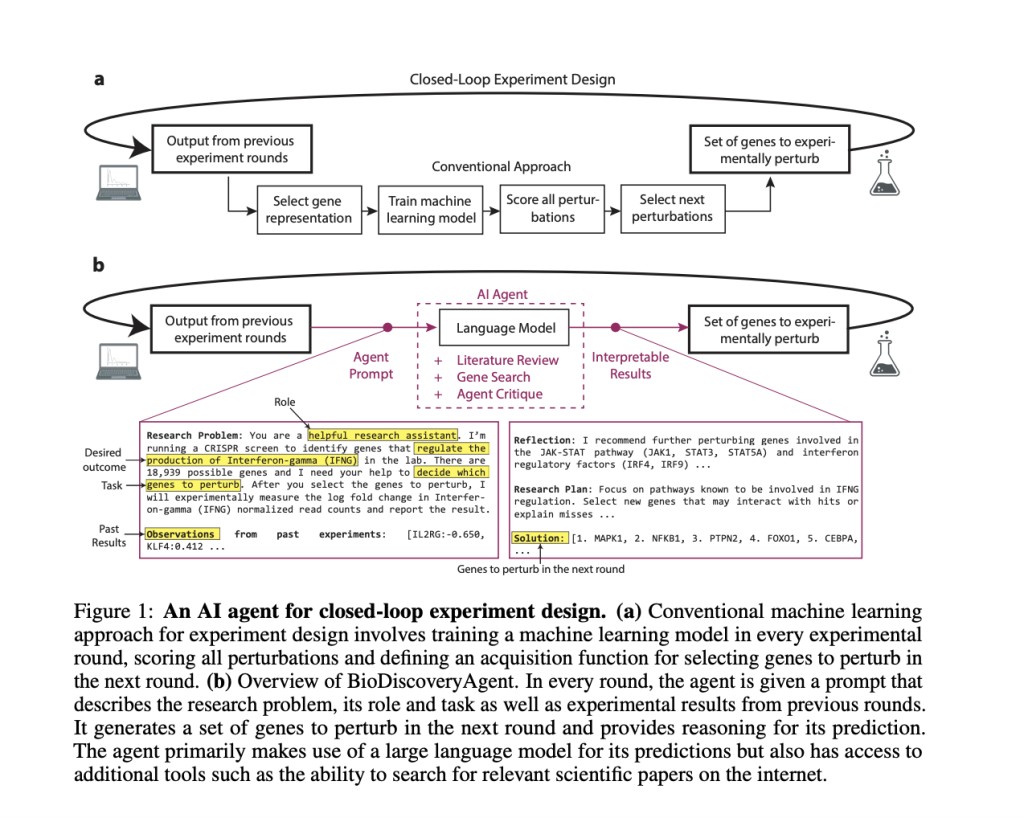Agents based on LLMs hold promise for accelerating scientific discovery, especially in biomedical research. They leverage extensive background knowledge to design and interpret experiments, particularly useful for identifying drug targets through CRISPR-based genetic perturbation. Despite their potential, LLM-based agents have yet to be fully utilized in designing biological experiments. Challenges include balancing freedom in exploring gene perturbations with biological validity, ensuring consistent experimental strategies across prompts, and maintaining decision-making interpretability with literature citations and human feedback. These agents could significantly enhance the efficiency of gene perturbation screens, which are vital for drug discovery and disease mechanism elucidation.
Stanford University and UCSF researchers have developed BioDiscoveryAgent, an AI tool that designs genetic perturbation experiments without needing a pre-trained machine learning model. Using an LLM and various tools, BioDiscoveryAgent suggests genes to perturb based on prior knowledge and experimental results. It searches scientific literature, analyzes datasets, and critiques its predictions. The agent improves the detection of desired phenotypes by 18% compared to Bayesian optimization methods and accurately predicts gene combinations. Its transparent decision-making process enhances the design of genetic experiments, providing a valuable resource for biomedical research.
Artificial intelligence has shown promise in various scientific fields, including simulating human behavior and exploring mathematical functions. AI models are effective in mining scientific literature and handling research tasks like data analysis and report generation. Advances in AI-driven lab experiments have been significant, particularly in chemical synthesis and materials discovery. In biology, LLMs capture detailed information about biological pathways and processes and can simulate these processes. AI for generating hypotheses in functional genomics is well-established, addressing the vast experimental space and combinatorial challenges. Previous studies have used machine learning to optimize genetic perturbation experiment designs.
BioDiscoveryAgent uses the Claude v1 Anthropic LLM to automate scientific discovery in biology. It accesses scientific knowledge, generates hypotheses, plans experiments, and interprets results. At each step, the agent selects a batch of genes for testing, incorporating previous results into the next prompt. BioDiscoveryAgent freely suggests genes, refining the list if needed. Its response format includes Reflection, Research Plan, and Solution, ensuring interpretability. The agent leverages tools like literature search via the PubMed API, gene feature analysis, and a critic agent to refine predictions. This comprehensive approach enhances the design of genetic perturbation experiments by utilizing extensive biological knowledge.
BioDiscoveryAgent selects batches of genes for testing, incorporating previous results into its prompts. BioDiscoveryAgent surpasses machine learning baselines in 1-gene perturbation experiments by 18% on average, especially in early rounds. It enhances performance by using tools like literature search, gene similarity analysis, and an AI critic. In 2-gene perturbation experiments, it outperforms random sampling by 130%. Integrating prior knowledge and experimental observations improves decision-making, highlighting the importance of both elements. BioDiscoveryAgent’s interpretable predictions, supported by literature references and critical insights, aid in human-in-the-loop feedback.
In conclusion, BioDiscoveryAgent introduces a new approach to biological experiment design, enhancing scientists’ capabilities by using an LLM to simplify the process into a single prompt. Unlike traditional multi-stage pipelines requiring manual design and retraining, this agent efficiently integrates prior biological knowledge and observational data. It solves the cold start problem and leverages various tools for information from literature and datasets, accelerating research. While effective, it performs variably across cell types and excels mainly in early experimentation stages. BioDiscoveryAgent complements existing methods, enhancing performance in low data regimes and offering improved reasoning and interpretability, making AI crucial in future experimental designs.
Check out the Paper and GitHub. All credit for this research goes to the researchers of this project. Also, don’t forget to follow us on Twitter. Join our Telegram Channel, Discord Channel, and LinkedIn Group.
If you like our work, you will love our newsletter..
Don’t Forget to join our 43k+ ML SubReddit | Also, check out our AI Events Platform
The post BioDiscoveryAgent: Revolutionizing Genetic Experiment Design with AI-Powered Insights appeared first on MarkTechPost.
Source: Read MoreÂ

